STAY in TOUCH
Instructional Design and Development
The effective design of an online course requires the completion of a detailed front-end examination to obtain a clear understanding of the intended learning goals and outcomes. Once this foundation activity has been completed, the design process can proceed with the development of course content that is aligned with enabling objectives and supported by formative assessment processes. The artifacts shown below are for an online “Fundamentals of Crisis Negotiation” Course and were developed to provide a learning experience that meets student needs while promoting the development of higher-order thinking skills.
Course Analysis
Course Analysis
An effectively developed course analysis establishes the foundation for the instructional design process. The primary intent of completing a detailed front-end examination of learning goals and outcomes is to provide the instructional designer with a clear understanding what educational materials need to be created, to include the context that learning activities will be delivered, characteristics of students, and the unique issues or challenges may be encountered when completing course activities. The analysis provided below is used as a guide for instructional design and development activities for an online “Fundamentals of Law Enforcement Crisis Negotiation” course that I created in the “Instructional Design for E-Learning” Class as part of the “E-Learning and Online Teaching” Graduate Certificate Program from the University of Wisconsin-Stout.
Course Title: Fundamentals of Law Enforcement Crisis Negotiation
Course Description: This online undergraduate course is designed to provide criminal justice students with a working knowledge of the law enforcement crisis negotiation process. The dynamic nature of a hostage and barricaded suspect incident requires the development of a negotiation strategy that is unique to each event. Students will learn the fundamental principles of the crisis negotiation process as well the actions that should be taken by the first responding officer to a crisis situation. This course will also explore the added complexities associated with crisis negotiation situations that involve suicide attempts.
Enrollment for college credit in this undergraduate course in the criminal justice curriculum is restricted to criminal justice, sociology or psychology degree-seeking students. Auditing of this course with no credit hours awarded is available to a: sworn member of law enforcement or corrections; non-law enforcement member of a crisis negotiation team; and mental health professional or a clergy member supporting law enforcement activities. Requests for exceptions to the requirements listed above must be submitted in writing and approved by the criminal justice college department head.
An asynchronous learning format is used to allow students the capability of viewing instructor video presentations and completing course assignments in a manner that meets their scheduling needs. The curriculum is designed to enhance the learning process through: the use of video/audio excerpts of actual negotiation events to reinforce negotiation concepts; weekly discussion boards to facilitate interaction between students; and papers that require analysis of various crisis negotiation concepts.
Student Enrollment: The general attributes of students as identified below should be considered during the instructional design phase of this course.
Course Description: This online undergraduate course is designed to provide criminal justice students with a working knowledge of the law enforcement crisis negotiation process. The dynamic nature of a hostage and barricaded suspect incident requires the development of a negotiation strategy that is unique to each event. Students will learn the fundamental principles of the crisis negotiation process as well the actions that should be taken by the first responding officer to a crisis situation. This course will also explore the added complexities associated with crisis negotiation situations that involve suicide attempts.
Enrollment for college credit in this undergraduate course in the criminal justice curriculum is restricted to criminal justice, sociology or psychology degree-seeking students. Auditing of this course with no credit hours awarded is available to a: sworn member of law enforcement or corrections; non-law enforcement member of a crisis negotiation team; and mental health professional or a clergy member supporting law enforcement activities. Requests for exceptions to the requirements listed above must be submitted in writing and approved by the criminal justice college department head.
An asynchronous learning format is used to allow students the capability of viewing instructor video presentations and completing course assignments in a manner that meets their scheduling needs. The curriculum is designed to enhance the learning process through: the use of video/audio excerpts of actual negotiation events to reinforce negotiation concepts; weekly discussion boards to facilitate interaction between students; and papers that require analysis of various crisis negotiation concepts.
Student Enrollment: The general attributes of students as identified below should be considered during the instructional design phase of this course.
This course is typically comprised of students in the criminal justice degree program, however, it will periodically include several individuals majoring in sociology or psychology.
Lorem ipsum dolor sit amet, sapien platea morbi dolor lacus nunc, nunc ullamcorper. Felis aliquet egestas vitae, nibh ante quis quis dolor sed mauris. Erat lectus sem ut lobortis, adipiscing ligula eleifend, sodales fringilla mattis dui nullam. Ac massa aliquet.
Students enrolled in this course may be attending other traditional on-campus classroom courses or completing the degree requirements entirely online.
Lorem ipsum dolor sit amet, sapien platea morbi dolor lacus nunc, nunc ullamcorper. Felis aliquet egestas vitae, nibh ante quis quis dolor sed mauris. Erat lectus sem ut lobortis, adipiscing ligula eleifend, sodales fringilla mattis dui nullam. Ac massa aliquet.
The age of students enrolled in this course typically ranges from 20-40 years old and includes full-time students and working adults.
Lorem ipsum dolor sit amet, sapien platea morbi dolor lacus nunc, nunc ullamcorper. Felis aliquet egestas vitae, nibh ante quis quis dolor sed mauris. Erat lectus sem ut lobortis, adipiscing ligula eleifend, sodales fringilla mattis dui nullam. Ac massa aliquet.
Prior to enrolling in this course students are required to possess a working knowledge of computer technology, however, it is likely that many have never taken an online course.
Lorem ipsum dolor sit amet, sapien platea morbi dolor lacus nunc, nunc ullamcorper. Felis aliquet egestas vitae, nibh ante quis quis dolor sed mauris. Erat lectus sem ut lobortis, adipiscing ligula eleifend, sodales fringilla mattis dui nullam. Ac massa aliquet.
Students in this course must be fluent in the English language.
Lorem ipsum dolor sit amet, sapien platea morbi dolor lacus nunc, nunc ullamcorper. Felis aliquet egestas vitae, nibh ante quis quis dolor sed mauris. Erat lectus sem ut lobortis, adipiscing ligula eleifend, sodales fringilla mattis dui nullam. Ac massa aliquet.
The gender of students in this course has no bearing upon instructional design considerations.
Lorem ipsum dolor sit amet, sapien platea morbi dolor lacus nunc, nunc ullamcorper. Felis aliquet egestas vitae, nibh ante quis quis dolor sed mauris. Erat lectus sem ut lobortis, adipiscing ligula eleifend, sodales fringilla mattis dui nullam. Ac massa aliquet.
The awareness of law enforcement practices for students enrolled in this course includes
those who: (a) have only completed academic coursework relating to the criminal justice profession; (b) are currently employed in the law enforcement or corrections field; and (c) are active or retired from military service.
Lorem ipsum dolor sit amet, sapien platea morbi dolor lacus nunc, nunc ullamcorper. Felis aliquet egestas vitae, nibh ante quis quis dolor sed mauris. Erat lectus sem ut lobortis, adipiscing ligula eleifend, sodales fringilla mattis dui nullam. Ac massa aliquet.
Instructional Delivery: This is an asynchronous course with no synchronous session provided. Instructor video presentations and video/audio excerpts of actual negotiation events are used to reinforce negotiation concepts. The application of learning is provided through: weekly discussion boards to facilitate student interaction; a final essay paper that involves analysis of crisis negotiation strategies; and development of a training aid for first responding officers to a crisis situation.
Anticipated Challenges: The anticipated challenges as identified below should be considered during the instructional design phase and in preparation for delivering this course.
Anticipated Challenges: The anticipated challenges as identified below should be considered during the instructional design phase and in preparation for delivering this course.
The primary challenge in the design and delivery of this course is to provide a learning environment that stimulates individuals who have no past exposure to the crisis negotiation process as well as those with current/past experience in the field of law enforcement, corrections or similar occupations.
Lorem ipsum dolor sit amet, sapien platea morbi dolor lacus nunc, nunc ullamcorper. Felis aliquet egestas vitae, nibh ante quis quis dolor sed mauris. Erat lectus sem ut lobortis, adipiscing ligula eleifend, sodales fringilla mattis dui nullam. Ac massa aliquet.
An additional challenge is the need to ensure that students in the sociology or psychology fields maintain their perspective of the crisis negotiation process upon law enforcement event resolution efforts rather than mental health considerations.
Lorem ipsum dolor sit amet, sapien platea morbi dolor lacus nunc, nunc ullamcorper. Felis aliquet egestas vitae, nibh ante quis quis dolor sed mauris. Erat lectus sem ut lobortis, adipiscing ligula eleifend, sodales fringilla mattis dui nullam. Ac massa aliquet.
From experience in teaching crisis negotiation topics in the traditional classroom setting, the subject matter is highly engaging to most all individuals. However, many students are often intimidated and fail to interface with individuals that already familiar with the crisis negotiation process (e.g., current law enforcement officers, psychology majors).
Lorem ipsum dolor sit amet, sapien platea morbi dolor lacus nunc, nunc ullamcorper. Felis aliquet egestas vitae, nibh ante quis quis dolor sed mauris. Erat lectus sem ut lobortis, adipiscing ligula eleifend, sodales fringilla mattis dui nullam. Ac massa aliquet.
Alignment Chart
Alignment Chart
A fundamental component of an online course for any discipline is to focus on the student learning experience rather than teaching same content presented through the traditional classroom environment. This requires that the selection of assessment activities for each course module be aligned with the associated terminal objective in a manner that both challenges and engages students in the learning process. One of the more effective methods of accomplishing this goal is the use of an Alignment Chart to detail the step-by-step “absorb”, “do” and “connect” process of completing each learning activity.(1) The basic premise of this instructional design method is that a student must first “absorb” knowledge through activities such as reading assignments, watching a video or following a presentation. Subsequently, activities must be selected that allow the student to “do” something with their newly acquired knowledge and often includes incorporating prior learning into the assessment process. Finally, “connect” element provides the student with a method of linking their knowledge to past experiences and real world situations. As an instructor, the use of absorb, do, and connect principles as part of the learning process provides a viable method of helping students better understand the applicability of a given course objective to their overall learning experience. The Alignment Chart provided below is for students in an online “Fundamentals of Law Enforcement Crisis Negotiation” course that I created in the “Assessment in E-Learning” Class as part of the “E-Learning and Online Teaching” Graduate Certificate Program from the University of Wisconsin-Stout.
Alignment Chart: “Fundamentals of Crisis Negotiation” Online Course
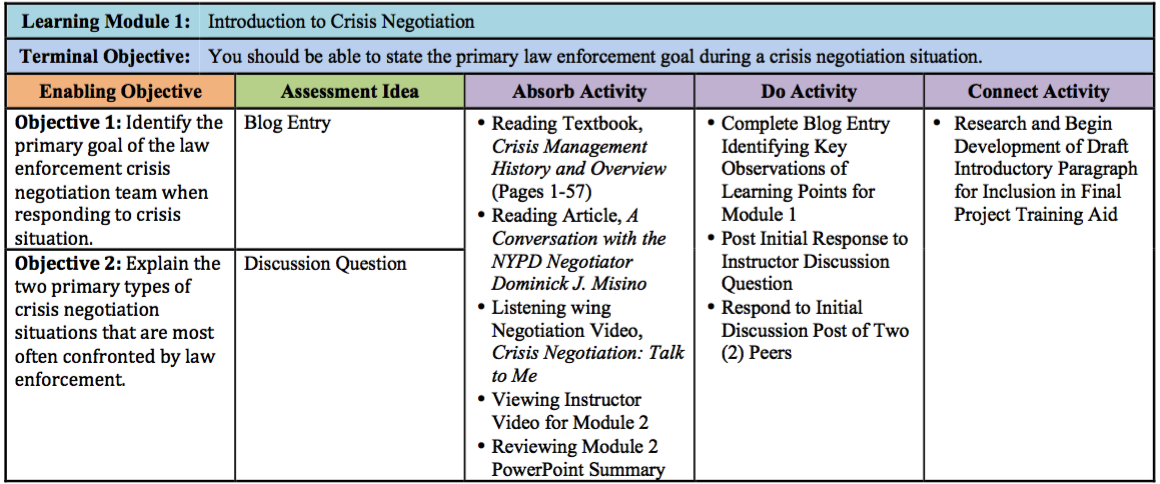
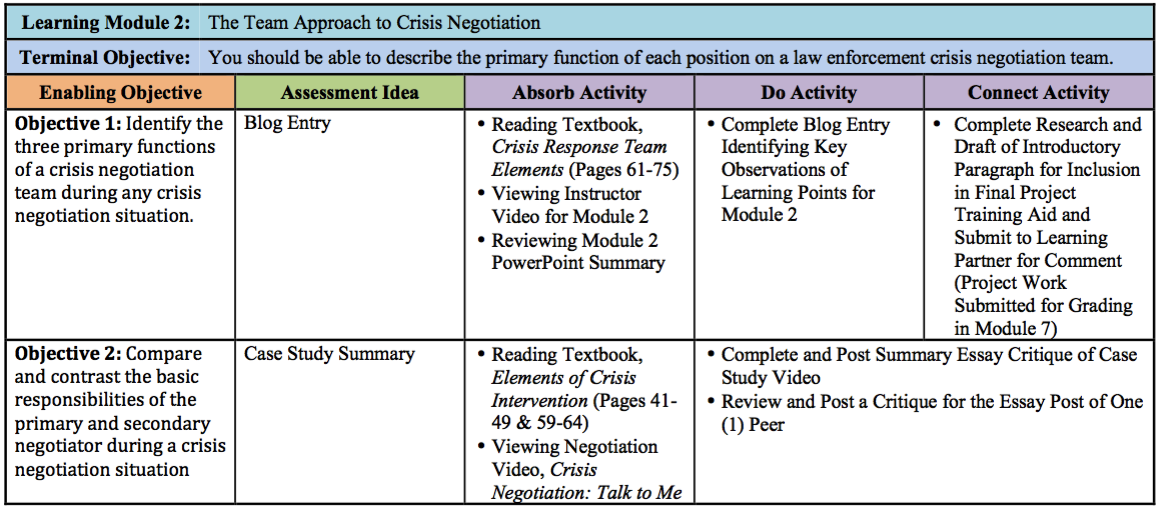
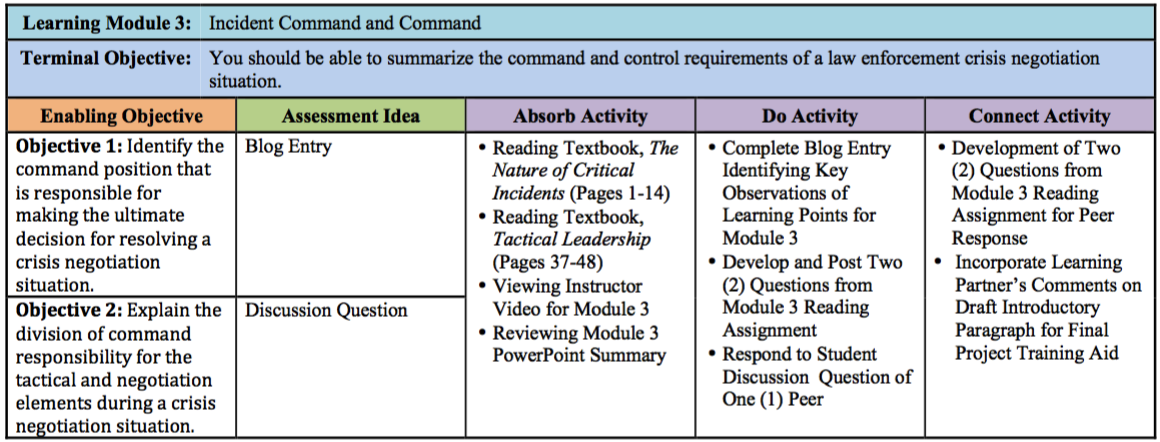
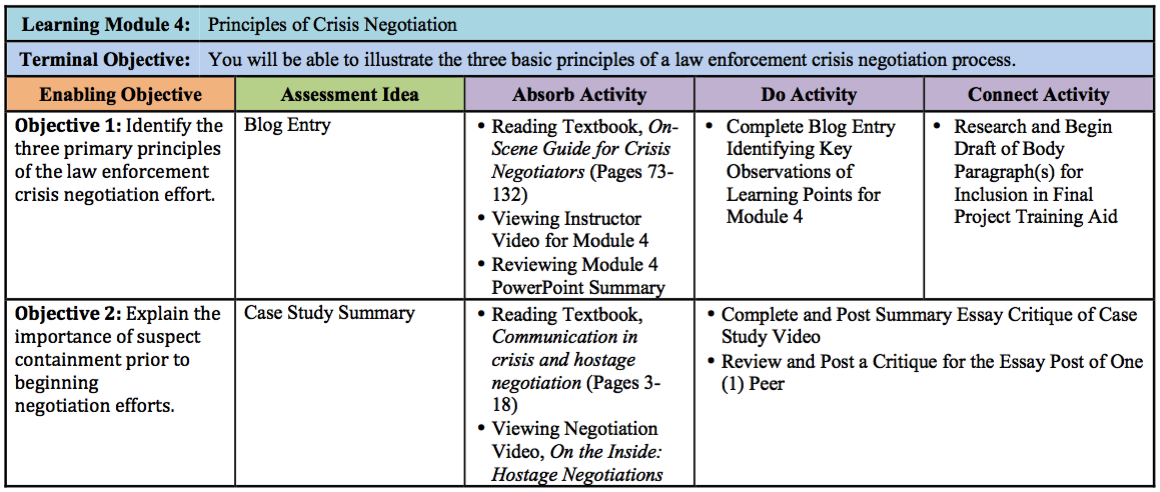
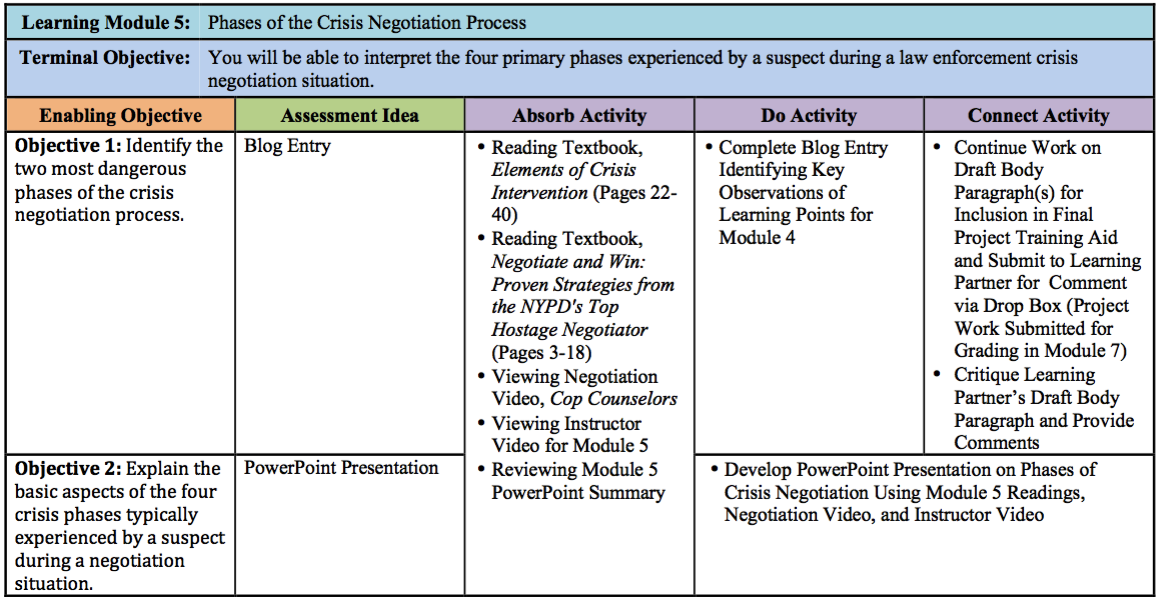
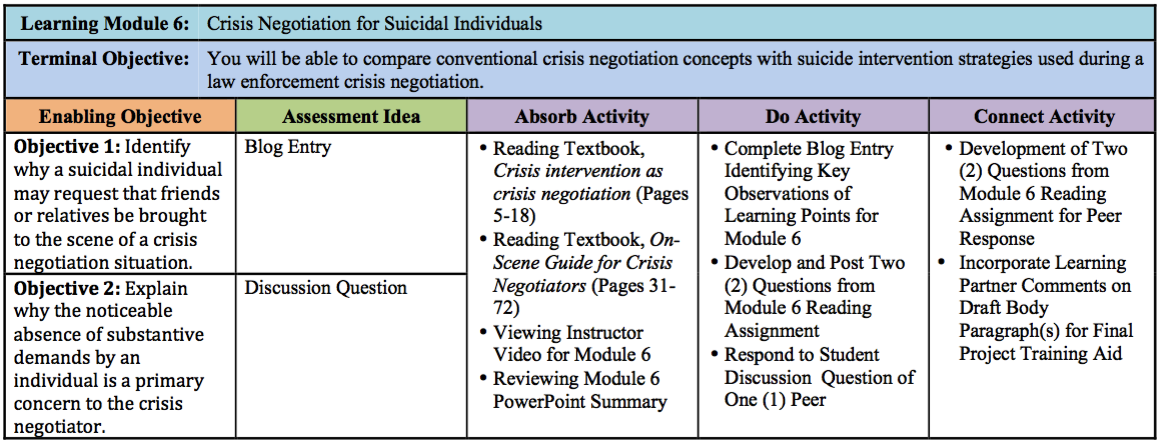
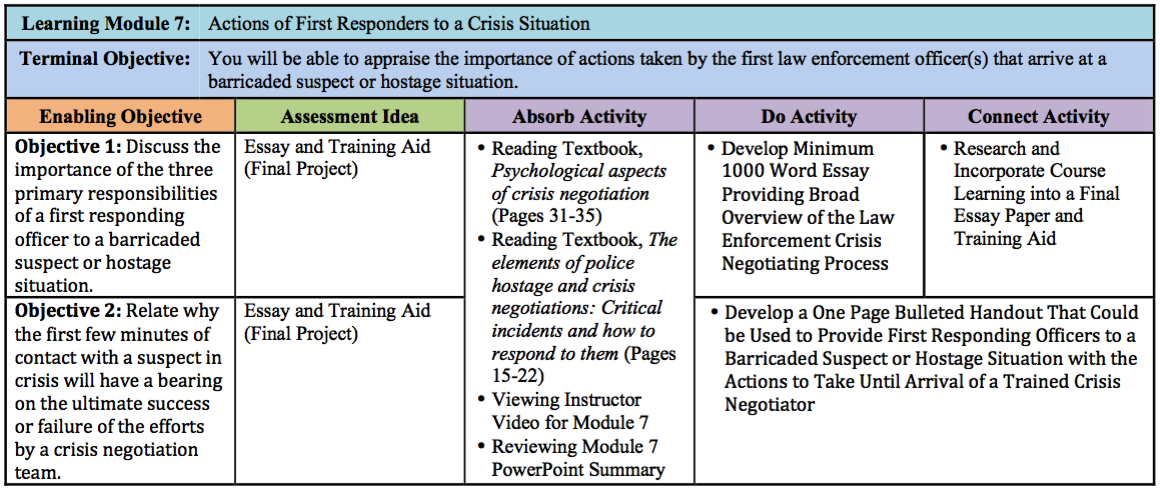
Concept Map
Concept Map
Concept mapping is a way of graphically illustrating the relationship between course objectives, student activities and assessment process. Items are displayed in a hierarchical manner beginning with the terminal and enabling objectives then progressing to student learning and assessment activities. Concept mapping is an excellent planning tool for instructional design and development activities while providing students with a readily accessible method of linking primary learning components. For an instructor, allowing students to brainstorm items for a concept map provides a valuable diagnostic tool for assessing the learning process as well as generating new ideas for class activities. The Concept Map provided below is for students in an online “Fundamentals of Law Enforcement Crisis Negotiation” course that I created in the “Assessment in E-Learning” Class as part of the “E-Learning and Online Teaching” Graduate Certificate Program from the University of Wisconsin-Stout.
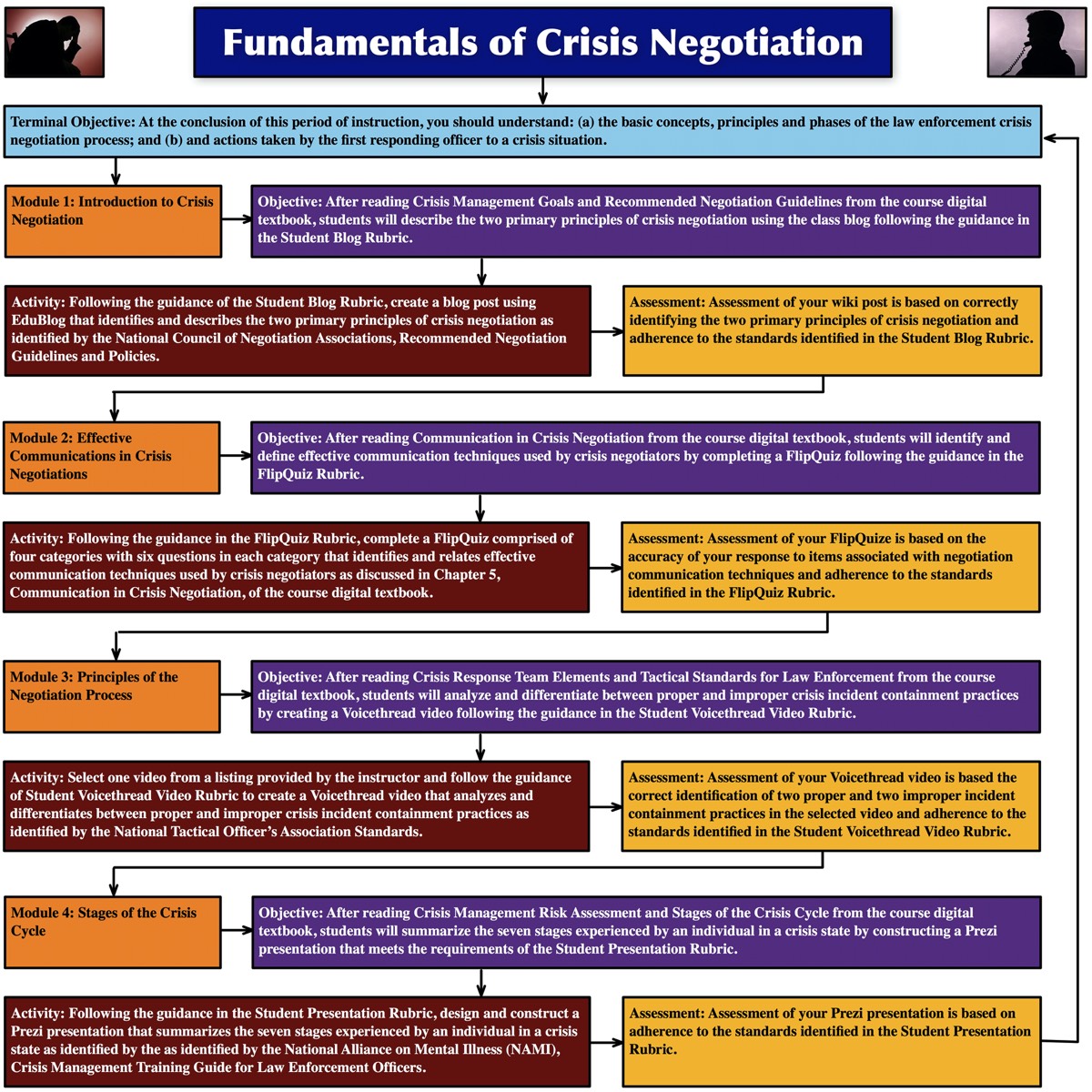
Learning Process
Learning Process
Research studies have shown that the brain’s working memory can only retain a limited amount of information at one time.(2) Accordingly, the instructional design process considers how educational content can be presented to motivate students and assists in the retention of information. This consideration is particularly important in the online environment where an instructor is not physically present to answer questions and guide the learning process. Shown below is learning the process that I developed for the “Fundamentals of Law Enforcement Crisis Negotiation” as part of the E-Learning and Online Teaching Graduate Certificate Program. By organizing learning activities in a logical and progressive manner using small “chunks” of information, content is easier for students to both understand and retain. The artifacts provided below describe the learning “chunking” process from the perspective of an instructor and student as developed as part of the “E-Learning and Online Teaching” Graduate Certificate Program from the University of Wisconsin-Stout.
Instructor Information
Instructor Information
The learning process can be greatly improved through the use of a three- step learning process comprised of “Absorb”, “Do” and “Connect” activities. The basic premise associated with learning in this manner is to break a student’s learning into chunks of information that can be applied in both the traditional classroom and online line environment (3). This format is especially beneficial for an online course considering that this method of instruction provides a structured step-by-step process for learning that has proven to be helpful for both students and educators (4).
Step 1 – “Absorb” Activities
“Absorb” activities provide students with information that they will need to recall later in the learning process. The use of a variety of “Absorb” such as reading, watching videos or viewing PowerPoint presentations also provides an instructor with a method to convey a high volume of information beyond the traditional lecture-based approach.
Step 2 – “Do” Activities
“Do” activities provide students with a method of discovery that applies the knowledge that they learned by completing “Absorb” activities. This requires that an instructor develop activities such as games, role-playing scenarios and simulations that are designed to keep information fresh in a student’s mind in a manner beyond the standardized testing process. This hands-on trial and error approach also demonstrates to the student that learning can often be fun, or at least mildly entertaining.
Step 3 – “Connect” Activities
The knowledge gained during “Absorb” activities provides the student with the ability to practice skills through “Do” activities. The subsequent use of “Connect” activities such as group discussions, critiquing video scenarios and problem solving provides a method for the instructor to apply learning to real-life situations.
There is no one process that ensures students can apply the knowledge that they have learned. However, the use of a structured process involving “Absorb”, “Do” and “Connect” activities provides a method that allows students to connect all of the dots, thereby completing learning process as facilitated by the instructor.
Student Information
Student Information
To help you develop a better understanding of the fundamental principles of crisis negotiation, you should approach the learning process in a step-by-step manner for each weekly module.
Step 1 – “Absorb” Activities
The first step is to gain knowledge from your weekly assignments by reading from the course textbooks, watching the instructor’s video and PowerPoint presentations, and viewing negotiation audio or video clips.
Step 2 – “Do” Activities
The second step allows you to apply your knowledge by completing activities such as blog entries, answering discussion questions, and responding to discussion questions developed by other students.
Step 3 – “Connect” Activities
The final step links your learning to situations that may be encountered in your professional or personal life by developing discussion questions, critiquing the work of other students, and completing research for your final project.
Approaching your learning in a structured step-by-step manner for each weekly module will allow you to complete all activities for this course without feeling overwhelmed. For example, when you started this course you may have looked at the final project for Module 7 and thought that you could not possibly complete a 1000 word essay that provides an overview of the crisis negotiation process. However, look at the learning process below from Module 3 and see how you progress in a step-by-step manner towards completing the final project.
Example Activity
Example “Absorb” - “Do” - “Connect” Activity
Learning Objective: After completing the assigned reading, the student will summarize the command and control requirements of a law enforcement crisis negotiation situation as identified in the discussion rubric.
Step 1 – “Absorb” Activities
You will gain additional knowledge of the crisis negotiation process by learning the concept of Incident Command and Control. This knowledge is gained by: (a) reading from the textbook; (b) viewing the instructor’s video presentation; and (c) reviewing the PowerPoint Presentation that summarizes key points of your weekly learning.
Step 2 – “Do” Activities
To apply your new-found knowledge, you will: (a) complete blog entry that identifies key observations for the weekly learning; (b) develop and post two questions from your reading assignment for response by other students; and (c) respond to one discussion question developed by another student.
Step 3 – “Connect” Activities
Making a personal connection to your learning is accomplished by working on your final essay paper in the following manner: (a) during last week’s module, you completed a draft of the introduction for your paper and provided it you’re your learning partner for comments; (b) this week you will review and incorporate comments from your learning partner into your draft; and (c) you will continue to conduct research for information to incorporate into your essay paper. Now you should see how the step-by-step learning process using “Absorb", “Do” and “Connect” Activities during each weekly module can help you complete the final essay project without feeling overwhelmed. Completing each activity is as simple as A-B-C.



